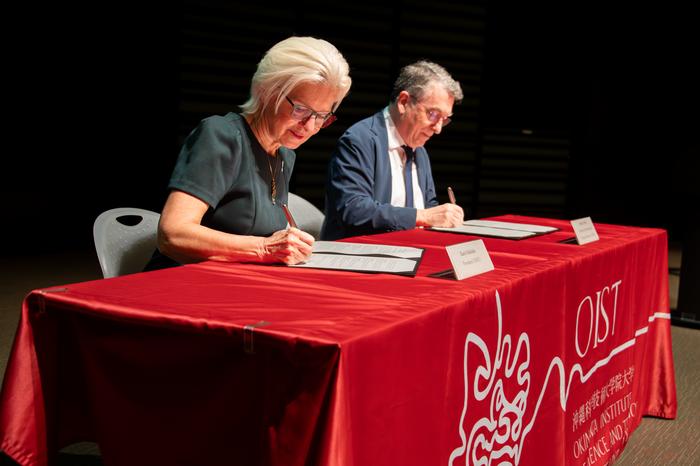The Okinawa Institute of Science and Technology (OIST) and France’s National Centre for Scientific Research (CNRS) have signed a letter of intent to work towards establishing an international research lab and agreeing on comprehensive academic collaboration.

Credit: OIST/Jeff Prine
The Okinawa Institute of Science and Technology (OIST) and France’s National Centre for Scientific Research (CNRS) have signed a letter of intent to work towards establishing an international research lab and agreeing on comprehensive academic collaboration.
The signing ceremony took place during the opening session of the OIST-CNRS Joint Symposium on West Pacific Marine Biology on April 23. Dr. Karin Markides, President and CEO, and Professor Vincent Laudet were among the speakers from OIST, and they were joined by representatives from CNRS, namely Dr. André Le Bivic, Director, CNRS Biology, Dr. Jacques Maleval, Director of the Tokyo Office, and Mr. Edouard Besserve, Deputy Director for Asia.
Having previously combined forces on two symposiums (one in 2022), OIST and CNRS will structure and strengthen their existing collaboration by establishing an international research lab to promote cooperation and inter-laboratory collaboration.
The researchers hope to accelerate biodiversity research in the Western Pacific region by conducting synergistic studies at various scales across fields in marine biology as they relate to the genomics, evolution, development, biochemistry, function, and ecology of a wide range of species, much of which is still unknown.
Upon signing the agreement, OIST President Markides noted that the agreement with CNRS is aligned with OIST’s strategy to grow its connections with academia around the world. “We are excited to collaborate with CNRS’s incredible scientists to advance our shared goals because we know that international scientific collaboration is a key to solving some of society’s biggest challenges.”
Dr. Le Bivic, Director of CNRS Biology, who is visiting OIST from France, “This is the first step towards greater collaboration. This partnership will bring more opportunities for exchange to countries in the Western Pacific region, and marine biology will be a major force in that,” he said, emphasizing the value of the partnership.
Photos from the signing ceremony are available here.
Discover more from Science
Subscribe to get the latest posts sent to your email.


